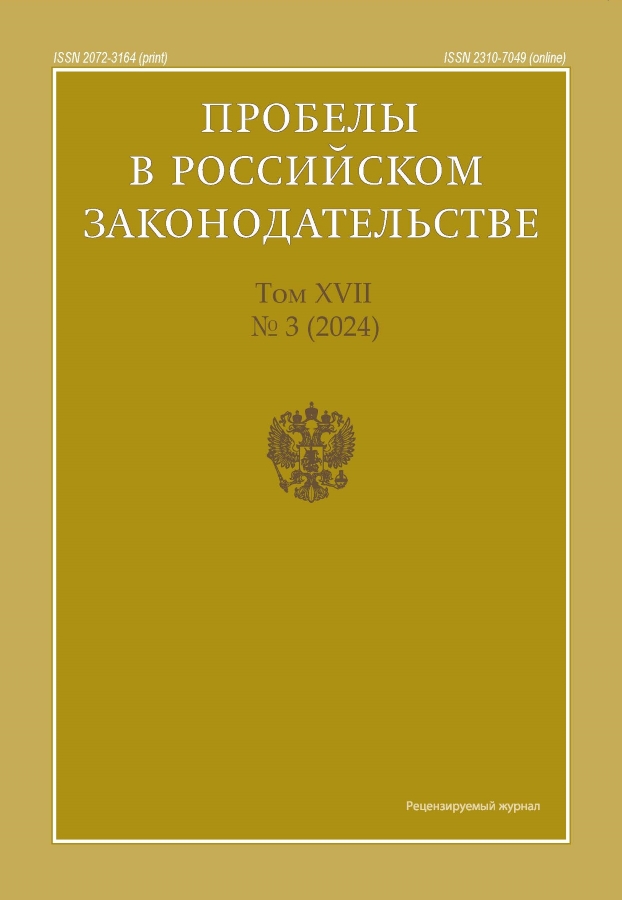The Impact of Evasion of Contract Signing on the Business Activities of the Customer and the Participant in Public Procurement
- Authors: Belyatkina K.A.1, Krivova Y.Y.2
-
Affiliations:
- Tula state university
- Financial university under the Government of the Russian Federation
- Issue: Vol 17, No 3 (2024)
- Pages: 73-78
- Section: Private Law (Civil) Sciences
- URL: https://journals.eco-vector.com/2072-3164/article/view/634208
- DOI: https://doi.org/10.33693/2072-3164-2024-17-3-073-078
- EDN: https://elibrary.ru/LUTFXE
- ID: 634208
Cite item
Abstract
The purpose of the research. The article considers the issue of recognizing the participant who submitted the only application for participation in the procurement as a result of competitive methods of determining a supplier (contractor, executor) as an evader of contract conclusion. Proposals are made to improve the legislation on the contractual system in the sphere of procurement in terms of fixing the possibility of concluding a contract between the customer and the participant who evaded the conclusion of the contract in the absence of intent due to the occurrence of objective reasons. To achieve this goal, the authors analyze the practice of the Federal Antimonopoly Service of Russia and its territorial bodies concerning the issue of the absence of intent of the participant from evading the conclusion of the contract. The scientific innovation of the work consists in the authors' attempt to comprehensively consider the legal regulation and law enforcement practice in the case of evasion of the sole participant of the procurement from the conclusion of the contract and the impact of this fact on the customer's ability to maximize the use of available resources allocated for the relevant financial year to meet the need for the acquisition of goods, works, services in a timely manner. Results. At present, there are numerous cases of failure of a procurement participant to sign a contract in a timely manner due to an unforeseen situation in the absence of a real intent to evade the conclusion of the contract. As a result of consideration of the case, the control body does not include such a participant in the register of unfair suppliers (contractors, executors), but also the possibility for the customer to conclude a contract with such a participant at the legislative level is not provided. In order to eliminate this gap, the authors propose to grant the relevant right to the customer to conclude a contract, fixing it at the legislative level.
Full Text
About the authors
Kristina A. Belyatkina
Tula state university
Author for correspondence.
Email: kristinabeliatkina@mail.ru
ORCID iD: 0000-0002-3006-9450
Scopus Author ID: 2546-4338
lecturer at the department of state and administrative law
Russian Federation, TulaYulia Yu. Krivova
Financial university under the Government of the Russian Federation
Email: curly_yu@mail.ru
ORCID iD: 0000-0003-3661-9430
Scopus Author ID: 1180857
senior lecturer at the department of psychology and human capital development
Russian Federation, MoscowReferences
- Alenkina A.U. Contractual system as a tool to improve the efficiency of state and municipal budget expenditures // International Journal of Humanities and Natural Sciences – 2018 – P.299.
- Andreeva L.V. Public procurement in Russia: legal regulation and measures to improve it: monograph – Moscow: Prospect – 2020 – P.232.
- Popova O.A. Public procurement as an effective tool to regulate the development of regional economy // Proceedings of St. Petersburg State University of Economics №. 6 –2014 – P.217.
- Tachkova I.A., Batsyleva M.V. Problems of functioning of the state order system in the Russian Federation // Scientific Journal «Economics. Sociology. Law» 2021 – № 1(21) – P.85.
Supplementary files









